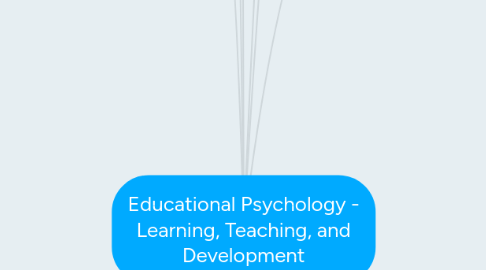
1. Week Three: Establishing a Positive Learning Environment
1.1. Every child as unique
1.1.1. Self-regulated learning
1.1.2. Learning styles
1.1.3. Knowing your students
1.2. Classroom management
1.2.1. Students co-create rules and norms
1.2.2. Communication channels
1.2.3. Be fair, consistent, and calm
1.3. Learning communities
1.3.1. Tribes
1.3.2. Collaboration
1.4. Questions for future learning: • How can I ensure my personal learning style does not overwhelm or impact my teaching style? • We encounter students with multiple exceptionalities each day in our classrooms, who can I contact for further support?
2. Week One: Planning for the upcoming school year
2.1. Reflexive Practirioner - See Image
2.2. Four Commonplaces of Education
2.3. Purposes of Education - Autonomous Learning
2.3.1. Christopher Watkins, “Learners in the driving seat,” Teaching Times 1, no. 2 (2012): 28-29.
2.4. Research in Educational Psychology - Quantitative and Qualitative
2.5. Curricular Planning - Top down approach
2.6. Constructivist Approach
2.7. Question for further learning: How can we make autonomous learning more widespread?
3. Week Five: Assessing Student Progress
3.1. Diagnostic Assessment
3.2. Lesson Planning
3.2.1. Backwards Design
3.2.2. Learning objectives
3.2.3. Blooms Taxonomy
3.2.3.1. Knowledge
3.2.3.2. Comprehension
3.2.3.3. Application
3.2.3.4. Analysis
3.2.3.5. Synthesis
3.2.3.6. Evaluation
3.2.4. Stiggin's Achievement Targets
3.2.4.1. Heiarchical Structure
3.2.4.2. Use of knowledge and attitudes and dispositions
3.2.5. Inquiry
3.2.5.1. Interrelating material between classes
3.2.5.2. Interpretation and transfer questions
3.3. Meta-cognition
3.3.1. Reflection, planning, gauging, comprehension
3.4. Working memory
3.4.1. Chunking
3.5. Select-organize-integrate
3.5.1. Not rote memorization
3.5.2. What is meaningful
3.6. Questions for future learning: • As outlined by Concept to Classroom (n.d.) there is little emphasis in schools on planning across subjects and the transfer of knowledge. How can I modulate direct instruction and other instructional designs outlined this week to ensure this transfer of knowledge? • Will these methods be efficient in achieving this goal? Or do you think inquiry based learning is the only means to ensure the transfer of knowledge between subjects?
4. Week Seven: Socio-cultural Considerations
4.1. Culturally Responsive Instruction
4.1.1. Class Culture
4.1.1.1. Heterogeneous cooperative learning
4.1.2. Classroom's physical design
4.1.2.1. Artifacts
4.1.2.2. Posters
4.1.2.3. Library
4.1.3. Culturally responsive differentiated instruction
4.1.3.1. Reshape curriculum
4.1.4. Community resources
4.1.4.1. Family
4.1.4.2. Diverse community leaders
4.2. Aboriginal Education
4.2.1. Address risk factors versus statistics
4.3. Socio-economic status
4.3.1. Impact on education
4.3.2. Can out perform or under-perform
4.3.3. Influence on parenting style & approach to education
4.3.3.1. Authoritarian (low) - threat to academic growth
4.3.3.2. Authoritative (middle-high) - fosters academic growth
4.4. Questions for future learning: • Where is a good place to look for racially, culturally, and ethnically diverse speakers to come to classrooms? • What do we do if despite efforts to promote a culturally inclusive class culture, students express prejudice and/or racism?
5. Week Two: Considering Developmental Differences
5.1. Development - orderly, varied pace
5.2. Cognitive Dis-equalibrium
5.2.1. Out of class resource - "The Learning Challenge"
5.3. Piaget – schemes and adaption
5.3.1. Role of the indvidual
5.4. Vygotsky – scaffolding
5.4.1. The power of collaborative thinking
5.5. Optimal zone = Yves Dodson Law
5.6. Growth mindset
5.7. Self worth = self concept + self esteem
5.8. Questions for future learning: - How do we ensure tasks are in the zone for optimal development - Which safeguards can we put in place so that tasks are neither too hard are too easy when we have classrooms of diverse learners?
6. Week Four: Making Instructional Decisions
6.1. Pedagogical Approaches
6.1.1. Direct Instruction
6.1.1.1. Teacher centric
6.1.2. Universal Design Learning
6.1.2.1. Equity
6.1.3. Inquiry teaching
6.1.3.1. Problem sovling
6.1.3.1.1. Teacher as faciltator
6.1.4. Many types of learners
6.1.5. Questions for future learning: • I have a strong grasp of how to implement inquiry learning in a physical education classroom, however I still would like further examples of how to implement inquiry learning in a secondary history class. • Innovative and off the wall ways to include exit cards in your classroom
7. Week Six: Individual Differences
7.1. Exceptionalities
7.1.1. High Incidence
7.1.1.1. Learning disabilities
7.1.1.2. Giftedness
7.1.1.3. Behavioral Disorders
7.1.1.3.1. ADHD
7.1.2. Low Incidence
7.1.2.1. Hearing Impariment
7.1.2.2. Severe mental disability
7.2. Special Intervention
7.2.1. 300,000 students
7.2.2. Individual Education Plans
7.2.2.1. 6 Phases
7.2.2.2. Educational Goals
7.2.3. Individual Placement and Review Committee IPRCs
7.2.4. Special Education
7.2.4.1. 1960s and 1970s
7.3. Education for All
7.3.1. Differentiated Instruction
7.3.2. Universal Design
7.4. Intelligence
7.4.1. Gardner - 8 Forms
7.4.2. Sternberg - 3 Forms
7.5. Questions for future learning: • How do we assist students with exceptionalities if parents or guardians are not supportive of the supports/processes in place? • We have presented with many technologies that promote UDL in classrooms. How accessible are these supports in mainstream Canadian classrooms? o How do we gain access to UDL systems? • I would like more information on Individual Placement and Review Committees (IPRC)
8. Week Eight Standardized Achievement Tests
8.1. Accountable
8.2. Fair
8.2.1. Sensitivity Commitee
8.2.2. Principles for Fair Student Assessment
8.2.3. Standards for Educational and Psychological Testing
8.3. Historical Basis
8.4. Provincially mandated
8.5. Criterion referenced
8.6. Controversial
8.6.1. Arguments for & against
